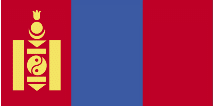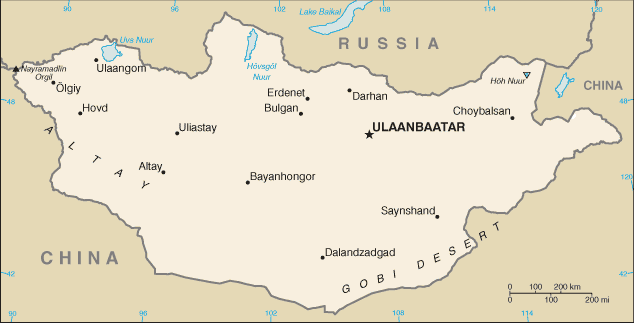|
Mongolia
|

|
Capital: Ulaanbaatar
Population: 3,225,167
Brief History of Mongolia:
Mongolia was inhabited by tribal peoples for thousands of years. It is most famous, however, for the powerful Mongol Empire that began in 1206 AD when a single empire was formed by the powerful ruler Chinggis (alsco called Genghis) Khan. Genghis Khan mobilized a great army of Mongol warriors and, along with the rulers who came after him, conquered much of Asia and Russia. Genghis Khan's grandson was the famous Kublai Khan. Kublai Khan conquered China and established the Yuan Dynasty. Kublai became famous in Europe due the writings of Marco Polo.
The Mongol dynasty in China was overthrown in 1368. By 1691, Mongolia itself was under control of China. Outer Mongolia was a Chinese province until 1911 when Russia took over. After the fall of the Russian Empire, China took control again for a brief period.
In 1921 Mongolia gained its independence with help from the Soviet Union. The government installed was communist along the lines of the Soviet Union.
The Geography of Mongolia
Total Size: 1,564,116 square km
Size Comparison: slightly smaller than Alaska
Geographical Coordinates: 46 00 N, 105 00 E
World Region or Continent: Asia
General Terrain: vast semidesert and desert plains, grassy steppe, mountains in west and southwest; Gobi Desert in south-central
Geographical Low Point: Hoh Nuur 518 m
Geographical High Point: Nayramadlin Orgil (Huyten Orgil) 4,374 m
Climate: desert; continental (large daily and seasonal temperature ranges)
Major cities: ULAANBAATAR (capital) 949,000 (2009)
The People of Mongolia
Type of Government: mixed parliamentary/presidential
Languages Spoken: Khalkha Mongol 90%, Turkic, Russian (1999)
Independence: 11 July 1921 (from China)
National Holiday: Independence Day/Revolution Day, 11 July (1921)
Nationality: Mongolian(s)
Religions: Buddhist Lamaist 50%, none 40%, Shamanist and Christian 6%, Muslim 4% (2004)
National Symbol: soyombo emblem
National Anthem or Song: Mongol ulsyn toriin duulal (National Anthem of Mongolia)
Economy of Mongolia
Major Industries: construction and construction materials; mining (coal, copper, molybdenum, fluorspar, tin, tungsten, and gold); oil; food and beverages; processing of animal products, cashmere and natural fiber manufacturing
Agricultural Products: wheat, barley, vegetables, forage crops; sheep, goats, cattle, camels, horses
Natural Resources: oil, coal, copper, molybdenum, tungsten, phosphates, tin, nickel, zinc, fluorspar, gold, silver, iron
Major Exports: copper, apparel, livestock, animal products, cashmere, wool, hides, fluorspar, other nonferrous metals
Major Imports: machinery and equipment, fuel, cars, food products, industrial consumer goods, chemicals, building materials, sugar, tea
Currency: togrog/tugrik (MNT)
National GDP: $13,290,000,000
** Source for population (2012 est.) and GDP (2011 est.) is CIA World Factbook.
Back to Geography Home Page
